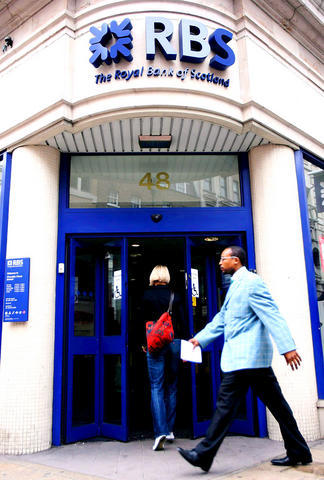European stock exchanges ended the week well into negative territory on Friday, dragged down by persistent fears for the health of the banking sector and its exposure to the US home mortgage crisis.
The London FTSE 100 index shed 1.08 percent to close at 6,291.2 while in Paris the CAC 40 lost 0.67 percent to reach 5,523.63. The Frankfurt Dax fell 0.71 percent to end the session at 7,612.26.
The Euro Stoxx 50 index of leading eurozone shares lost 0.44 percent to reach 4,282.4 by the end of trading.

PHOTO: EPA
In London real estate lender Alliance and Leicester fell 6.32 percent to ?6.07 on renewed fears for its financing. The bank is seen as particularly fragile in the current financial market turmoil because of its heavy borrowing needs.
Many banks around the world have cut back on their lending in response to the collapse of the US subprime -- or high-risk -- US morgage market. A wave of foreclosures has undermined the value of billions of dollars in securities held by banks and finance institutions that are backed by such mortgages.
Elsewhere in the financial sector, Northern Rock fell 1.55 percent to ?1.326, HBOS was down 2.4 percent at ?7.595 and Royal Bank of Scotland gave up 4.9 percent to close at ?4.365.
In Paris energy giant Total gained 1.34 percent to finish at 54.32 euros on higher crude prices, which reflected OPEC's rejection of appeals for an increase in its production.
As in London, banks in Paris weighed heavily on market sentiment. Societe Generale shed 2.6 percent to reach 102.27 euros while BNP Paribas fell 1.71 percent to 71.46 euros.
In Frankfurt chipmaker Infineon was the day's big loser, sliding 10.44 percent to 8.15 after several banks lowered their projections for the share.
Elsewhere there were declines of 1.34 percent to 8,478.8 on the Swiss Market Index, 1.32 percent to 500.08 in Amsterdam, and 1.12 percent to 4,060.71 in Brussels.
There were gains of 0.23 percent to 38,535 in Milan and 0.27 percent to 15,769 in Madrid.

Quanta Computer Inc (廣達) chairman Barry Lam (林百里) is expected to share his views about the artificial intelligence (AI) industry’s prospects during his speech at the company’s 37th anniversary ceremony, as AI servers have become a new growth engine for the equipment manufacturing service provider. Lam’s speech is much anticipated, as Quanta has risen as one of the world’s major AI server suppliers. The company reported a 30 percent year-on-year growth in consolidated revenue to NT$1.41 trillion (US$43.35 billion) last year, thanks to fast-growing demand for servers, especially those with AI capabilities. The company told investors in November last year that

Intel Corp has named Tasha Chuang (莊蓓瑜) to lead Intel Taiwan in a bid to reinforce relations between the company and its Taiwanese partners. The appointment of Chuang as general manager for Intel Taiwan takes effect on Thursday, the firm said in a statement yesterday. Chuang is to lead her team in Taiwan to pursue product development and sales growth in an effort to reinforce the company’s ties with its partners and clients, Intel said. Chuang was previously in charge of managing Intel’s ties with leading Taiwanese PC brand Asustek Computer Inc (華碩), which included helping Asustek strengthen its global businesses, the company

Taiwanese suppliers to Taiwan Semiconductor Manufacturing Co. (TSMC, 台積電) are expected to follow the contract chipmaker’s step to invest in the US, but their relocation may be seven to eight years away, Minister of Economic Affairs J.W. Kuo (郭智輝) said yesterday. When asked by opposition Chinese Nationalist Party (KMT) Legislator Niu Hsu-ting (牛煦庭) in the legislature about growing concerns that TSMC’s huge investments in the US will prompt its suppliers to follow suit, Kuo said based on the chipmaker’s current limited production volume, it is unlikely to lead its supply chain to go there for now. “Unless TSMC completes its planned six

TikTok abounds with viral videos accusing prestigious brands of secretly manufacturing luxury goods in China so they can be sold at cut prices. However, while these “revelations” are spurious, behind them lurks a well-oiled machine for selling counterfeit goods that is making the most of the confusion surrounding trade tariffs. Chinese content creators who portray themselves as workers or subcontractors in the luxury goods business claim that Beijing has lifted confidentiality clauses on local subcontractors as a way to respond to the huge hike in customs duties imposed on China by US President Donald Trump. They say this Chinese decision, of which Agence